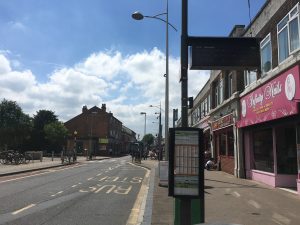Sorry for the clickbaity title, but hey, we know it works.
I went through four very self-assured years as an English major, hating the “What will you do post-grad?” question but always having some kind of answer: one that would satisfy…
- my grandma
- my partner’s parents
- my friend pursuing a Bachelor of Science
- etc.
I won’t bother giving you the half-artificial answers I gave these people, most of whom were genuinely and benignly curious about what kind of life I would have with this kind of undergraduate “training,” if you even want to call it that, but here’s the real answer: I had only but a faint, faint clue. As I approached graduation, I fixated a lot on the people who I knew graduated with English degrees from UBC. Outside of graduate school students, none of them had the same job. Editor at Penguin Random House. Sociology professor. Teacher. Lawyer. Public relations professional. Executive director at a non-profit.
More importantly, none of them planned out the steps to get where they ended up at that time that I spoke to them. I was hyper aware of this fact throughout my job application process, so I wasn’t too worried about the fact that I didn’t know exactly what the next steps were.
In my journal roughly around graduation time, I wrote out all the things I knew I cared about in a professional life, and they were vague, broad things like being community-centred, words-based, team-oriented. Having a work-life balance. Believing in my employer’s mission or cause. This approach was right, but not necessarily helpful at the time when I was applying for jobs.
So my approach shifted, for the worse, toward “not being picky.” Despite my confidence that I would be some kind of okay, I also knew that I didn’t know what was really out there, what I was good at, and what the world wanted from me. So I applied for jobs thinking I didn’t really have the room to be picky. In other words, I applied for jobs that I knew I wouldn’t take even if I was made an offer, which put me in difficult positions, because I would either get offers that felt like I should accept but didn’t want to, or I couldn’t commit fully to a hiring process, which really shows during an interview. Employers can tell when you’re bought in, and when you’re not.
Here was my biggest mistake: I should have, and could have, been picky.
I want to emphasize that what I’m sharing here is my specific experience. I know that this isn’t the case for everyone, so take what I’m saying with a grain of salt, and what I’m saying is: Have optimism, but it’s not going to be easy. Applying for jobs was draining. I shouldn’t have been, but by June, I felt discouraged and impatient. I also wanted to be earning money. And, I can’t emphasize this enough, applying for jobs was so much work. I am no stranger to the job application process: the nature of getting jobs through UBC, whether through co-op (which I didn’t do) or internship programs or Work Learn (both of which I did do), is you have to apply for multiple positions. So I was used to applying for multiple jobs at once, but I cannot stress the dramatic increase in volume for post-graduation job applications versus during school, for positions meant only for students.
I kept a spreadsheet to keep track of jobs I applied for, which I’m not saying you have to do, but if you know me then you know that lists and spreadsheets and planning and tracking is just generally kind of my style. Largely due to my “don’t-be-picky” strategy, I ended up applying for over 50 jobs until I got an offer for a position I was excited about at an organization that I believed in. Had I known at the beginning what I know now, that number would probably be cut in half.
So, how did my application process change? After doing a few interviews (over the phone and in person), getting one offer and a few rejections, and doing a little bit of travelling, I realized that I needed to stop applying for jobs I didn’t see myself accepting, ever. If I didn’t like it from the posting, I wouldn’t like it during the interview or even if I get the offer.
I also started focusing on the opportunities in front of me. I got so caught up in jobs that I thought were such a good fit that when I got invited to interviews for other jobs, I would only half-commit to those interviews because I thought other invitations would be coming. They didn’t.
When Dixon showed up as an opportunity, I genuinely thought I didn’t have much of a chance, based both on my experience over the last couple of months and how (un)qualified I thought I was. Despite what I thought, I was invited to an interview. I did my research (unbeknownst to me when i applied, I had two friends who had worked at Dixon). I went to the interview, and at that point, I knew that my predictions didn’t really amount to anything, so I wasn’t holding my breath. I had also, around the same time, interviewed for a digital internship for a private sector job that I was pretty confident I would get, and I would have accepted either, but I knew I wanted Dixon.
I accepted because–and I can’t emphasize this enough–Dixon had such a good reputation in my community, and the people were obviously fantastic from the get-go. Everything else fell into place perfectly around that: I would be challenged in this position because, even if I am qualified (which I am), it’s a step up for me. That was another reason I accepted. Yet another reason was that the position was only four days a week. I could have been making more at another job with full-time hours, but this way I would have time and energy to develop professionally in other ways, or time to devote to myself, or I could keep teaching skating, which would make up the income that I lose in working only 28 hours a week.
But at the time that I accepted, these things weren’t obvious yet. I mentioned earlier that I had been feeling discouraged and impatient: these were factors, and I can’t deny that. I wanted to start making money, and I would have accepted the next offer I got at that point, especially since I was being pickier in my process. I got incredibly lucky with my situation, but I also won’t diminish the fact that I worked hard to be able to get here.
I planned out almost every hour of my four years of undergrad. So you can understand my frustration with this fact, something which I knew but didn’t really learn until this spring: there is no exact science to applying for jobs, or being offered jobs. Sometimes it really is just timing. Fit. Luck. Things that are completely out of your control. It sucks. But it’s not so dreary as all the Grown-Ups told me when I talked about my English degree. My biggest takeaway from this experience is a real faith in the Universe in being able to work things out, if not in ways that you expect. More often, actually, in ways that you don’t expect. So be patient. Trust the process. And, especially if you’re a liberal arts major, be brave. Be open to the possibilities, and be especially open to the possibilities you can’t even imagine.

 If home is found in the crevices of human experience, homesickness is most certainly found in the expanses of suitcase living: sharing a room, having to take toiletries with you to the bathroom and back, not being able to leave your belongings lying about. (Mommy, if you’re reading this: I leave my room messy because that’s just part of the experience of being at home!) I am excited to be able to leave my toothbrush on the bathroom counter, to unpack my clothes from my suitcase. (Maybe long-term solo travel isn’t for me after all. How distressing.)
If home is found in the crevices of human experience, homesickness is most certainly found in the expanses of suitcase living: sharing a room, having to take toiletries with you to the bathroom and back, not being able to leave your belongings lying about. (Mommy, if you’re reading this: I leave my room messy because that’s just part of the experience of being at home!) I am excited to be able to leave my toothbrush on the bathroom counter, to unpack my clothes from my suitcase. (Maybe long-term solo travel isn’t for me after all. How distressing.) Having said that, though, I don’t think I can stress enough how much the English midlands and the English countryside felt like home to me. As we drove back from Chatsworth House, widely believed to be the inspiration for Mr. Darcy’s Pemberley in Jane Austen’s Pride and Prejudice (one of my favourite books), I looked around at the grids of farmland separated by stone walls and hedges and I found myself thinking about Dr. Dalziel’s Honours seminar on storytelling, and Thomas Hardy’s Far from the Madding Crowd.
Having said that, though, I don’t think I can stress enough how much the English midlands and the English countryside felt like home to me. As we drove back from Chatsworth House, widely believed to be the inspiration for Mr. Darcy’s Pemberley in Jane Austen’s Pride and Prejudice (one of my favourite books), I looked around at the grids of farmland separated by stone walls and hedges and I found myself thinking about Dr. Dalziel’s Honours seminar on storytelling, and Thomas Hardy’s Far from the Madding Crowd. British English literature, the literary genius that the discipline holds him up to be. You understand how the idea dismantles a great bulk of my academic field: though I am not the most familiar with Shakespeare’s works as far as an English major goes, and I am skeptical of the British white male canon in general, I was eager to make a pilgrimage to Shakespeare’s home.
British English literature, the literary genius that the discipline holds him up to be. You understand how the idea dismantles a great bulk of my academic field: though I am not the most familiar with Shakespeare’s works as far as an English major goes, and I am skeptical of the British white male canon in general, I was eager to make a pilgrimage to Shakespeare’s home.